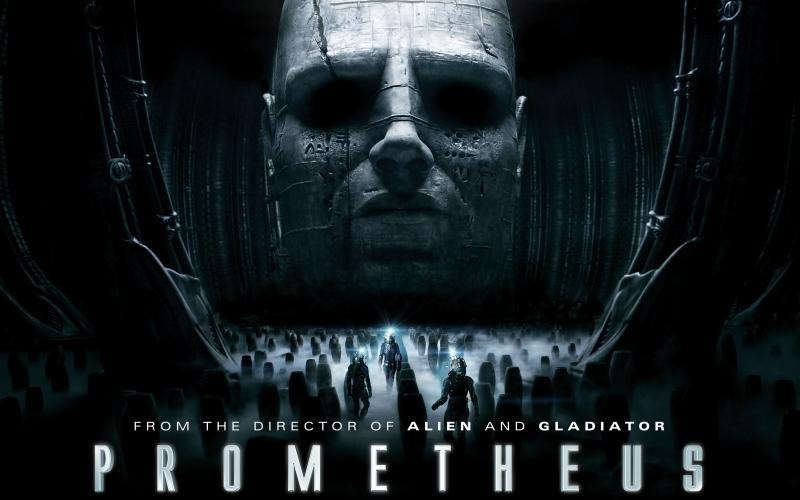Prometheus (2012)

Released in 2012, Ridley Scott’s “Prometheus” is a science fiction film that serves as both a prequel and a thematic exploration of the director’s influential 1979 film, “Alien.” Set in a future where interstellar travel has become a reality, “Prometheus” delves into themes of creation, existentialism, and humanity’s quest for knowledge. With its ambitious narrative, stunning visuals, and philosophical undertones, the film presents a complex and thought-provoking addition to the sci-fi genre.
“Prometheus” is set in the late 21st century and follows the crew of the eponymous spacecraft, Prometheus, as they embark on a mission to explore a distant moon, LV-223. The journey is inspired by a series of archaeological discoveries on Earth, which suggest that humanity was visited by extraterrestrial beings—referred to as the “Engineers”—millennia ago.
The narrative begins with the discovery of ancient star maps that point to LV-223 as a potential source of answers about humanity’s origins. The crew, led by Dr. Elizabeth Shaw (Noomi Rapace) and her partner Charlie Holloway (Logan Marshall-Green), alongside a corporate representative, Meredith Vickers (Charlize Theron), and the android David (Michael Fassbender), set out to uncover the truth behind these findings.
Upon arriving on LV-223, the crew encounters remnants of an ancient alien civilization, including mysterious monoliths and a derelict spaceship. As they explore further, they uncover disturbing evidence about the Engineers’ experiments and their connection to humanity. The discovery leads to catastrophic events, revealing the dark and violent nature of the Engineers and their ultimate plans.
The film’s climax involves a desperate struggle for survival as the crew confronts both the hostile environment and the remnants of the alien technology. Dr. Shaw’s quest to understand her own existence and the nature of the Engineers’ intentions culminates in a dramatic confrontation that challenges the boundaries of human understanding.
The film’s success can be attributed to its richly developed characters and the compelling performances of its cast:
Noomi Rapace as Dr. Elizabeth Shaw: Noomi Rapace portrays Dr. Elizabeth Shaw, a scientist driven by a deep sense of curiosity and a personal quest for answers about her faith and humanity’s origins. Rapace’s performance captures Shaw’s determination, vulnerability, and emotional depth as she navigates the dangers of LV-223 and confronts existential questions about creation and existence.
Michael Fassbender as David: Michael Fassbender’s portrayal of the android David is one of the film’s standout performances. David is a complex character with ambiguous motives, and Fassbender brings a nuanced and unsettling presence to the role. David’s interactions with the human crew and his underlying agendas drive much of the film’s tension and philosophical inquiry.
Charlize Theron as Meredith Vickers: Charlize Theron plays Meredith Vickers, a corporate executive with a cold and calculating demeanor. Theron’s performance adds a layer of tension and intrigue to the film, as Vickers’s motivations and intentions become increasingly apparent. Her character’s conflicting interests and actions contribute to the film’s dramatic tension.
Logan Marshall-Green as Charlie Holloway: Logan Marshall-Green portrays Charlie Holloway, Dr. Shaw’s partner and a scientist driven by ambition and a desire for discovery. Holloway’s character arc highlights the personal and ethical dilemmas faced by those seeking to unlock the mysteries of the universe.

Ridley Scott’s direction of “Prometheus” is characterized by its grand scale and thematic depth. Scott’s vision for the film combines elements of space exploration with philosophical and existential questions, creating a narrative that challenges viewers to consider the nature of creation and humanity’s place in the universe.
The cinematography, by Dariusz Wolski, is a key element in conveying the film’s awe-inspiring visuals and atmospheric tension. The use of expansive shots of space, intricate set designs, and striking visual effects contributes to the film’s immersive experience. The visual style effectively captures the grandeur and isolation of space exploration, as well as the eerie and unsettling aspects of the alien environment.

“Prometheus” explores several themes and employs various symbols to enrich its narrative:
Creation and Origins: One of the central themes of “Prometheus” is the exploration of creation and the origins of humanity. The film examines the idea that humanity’s creators, the Engineers, may have had a hand in shaping human evolution. This theme raises questions about the nature of existence and the search for meaning in the universe.
Existentialism and Human Curiosity: The film delves into existential themes, particularly the quest for knowledge and the consequences of humanity’s desire to understand its place in the cosmos. The characters’ motivations to uncover the truth about the Engineers reflect broader philosophical questions about the limits of human understanding and the risks associated with seeking knowledge.
Technology and Artificial Intelligence: The character of David represents the theme of artificial intelligence and the ethical implications of creating sentient beings. David’s interactions with the human crew and his own internal conflicts highlight the complexities of artificial intelligence and its potential impact on human beings.
The Limits of Human Knowledge: “Prometheus” explores the idea that some knowledge may be beyond human comprehension and that the pursuit of certain truths can lead to unforeseen consequences. The film suggests that the quest for understanding can be both illuminating and destructive.

“Prometheus” was released during a period marked by renewed interest in science fiction and exploration-themed films. The film’s connection to Ridley Scott’s “Alien” series, along with its ambitious storytelling and visual effects, reflects the contemporary fascination with space exploration and existential questions.
The film’s exploration of creation and humanity’s origins resonates with broader cultural and philosophical discussions about the nature of existence and the role of technology in shaping human experience. “Prometheus” contributes to the ongoing dialogue about the ethical and existential implications of scientific discovery and technological advancement.

“Prometheus” (2012) is a visually stunning and thematically rich film that combines science fiction with philosophical inquiry. Directed by Ridley Scott and featuring a compelling cast, the film explores profound questions about creation, existence, and the limits of human knowledge. Its ambitious narrative, striking visuals, and exploration of complex themes make it a significant entry in the sci-fi genre. As a prequel to “Alien” and a standalone exploration of existential themes, “Prometheus” continues to captivate audiences and provoke thoughtful discussion about the nature of humanity and the universe.
Suggested videos for you:
Suggested videos for you:
@lovrstify99 Jurassic World Fallen Kingdom (2018) – The Jaws of the Indoraptor #movie #movieclips #highlight #jurassicpark #indoraptor #kingdom #acitonmovieclips
Suggested videos for you:
@licktowing11 IMMORTALS (2011) Gods V Titans Scene. #movie #movieclips #highlights #moviehighlights #godstita #titans











